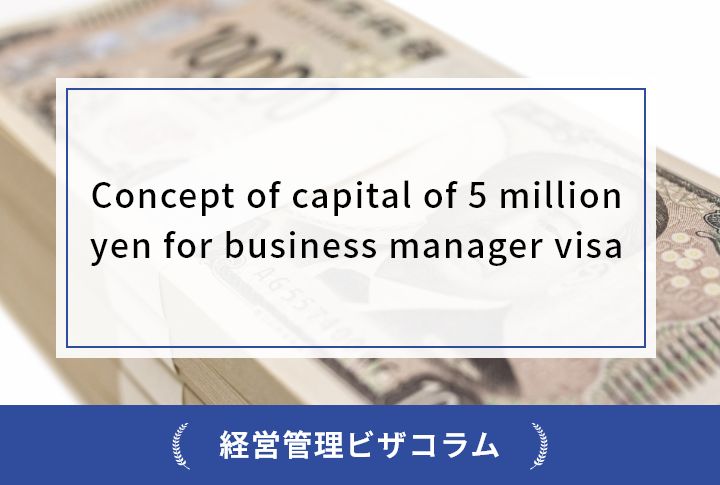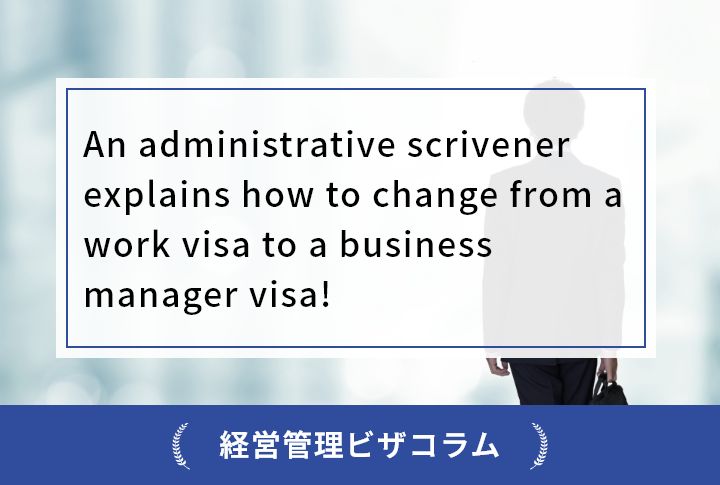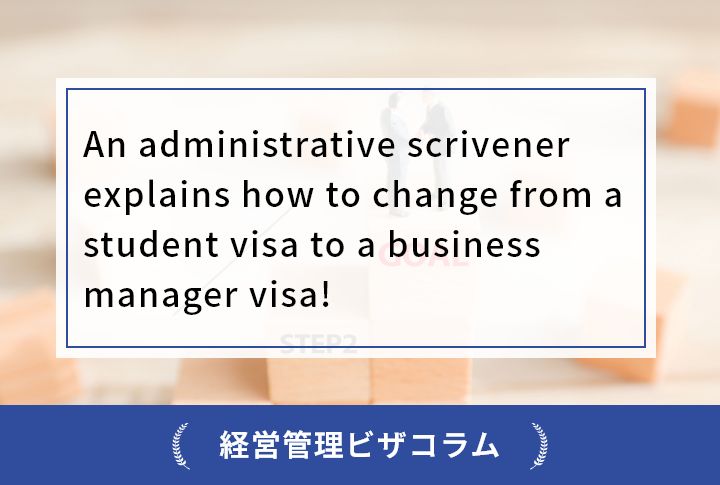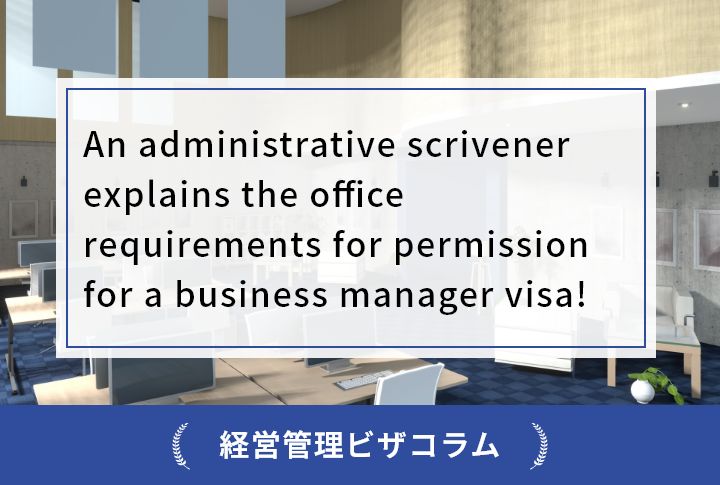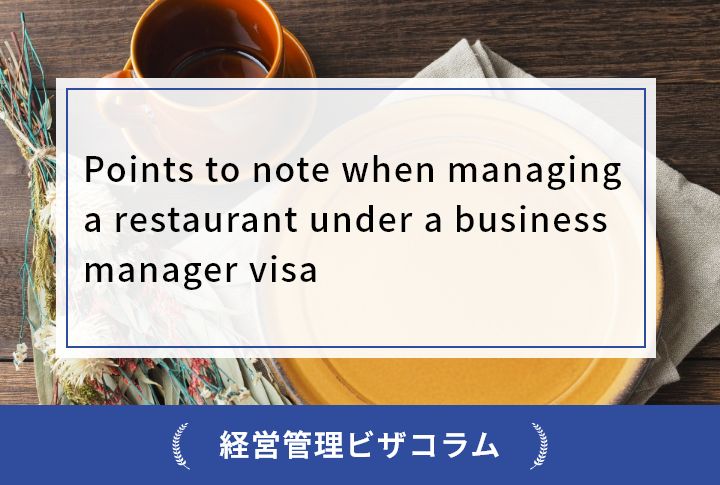Let’s fully understand the relationship between business manager visas and executive remuneration!
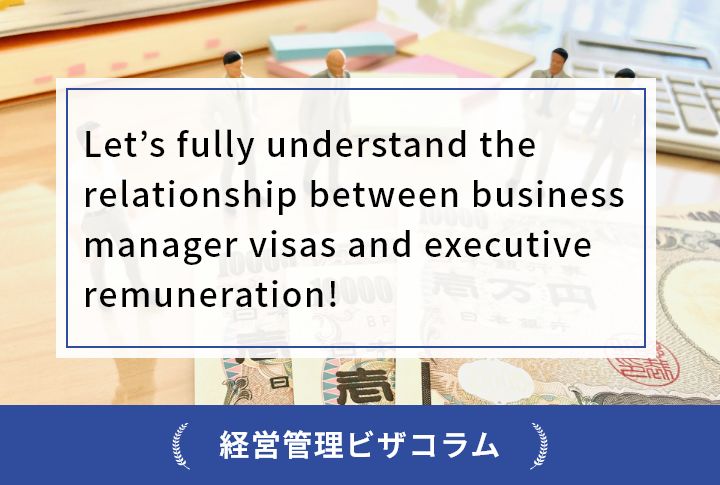
Many people incorporate companies to obtain a business manager visa.
When it comes to actual incorporation of a company, there are many matters that must be decided.
One of them is executive remuneration.
In many cases, there are no advising tax accountants yet at the time of incorporation, so people ask administrative scriveners who support their visa applications questions about executive remuneration.
Therefore, in order to answer such questions, we will explain about the relationship between business manager visas and executive remuneration in this article! This article includes necessary and sufficient information for those who are incorporating a company to obtain a business manager visa.
If you are considering to get a business manager visa, please refer to this article.
Index
1. The concepts of executive remuneration
(1) There is a deadline for determining executive remuneration!
When obtaining a business manager visa, many people incorporate a company.
The payment of executive remuneration is said to be periodic payment of the same amount (teiki-dogaku-kyuyo), and the executive remuneration per term must be decided within 3 months from the incorporation of the company.
In other words, the executive remuneration must be decided within 3 months after the incorporation of a company by predicting the future sales. For that, it will be necessary to perform an appropriate sales simulation.
Periodic payment of the same amount means paying the same amount of salary at regular intervals within 1 month (e.g. paying on a fixed date every month).
In order to prove this payment, in practice, it is required to leave history of payments by transferring money from a corporate account to an individual account.
Then why must executive remuneration be decided within 3 months of the incorporation of a company?
The amount of company profits is its sales less expenditure. Executive remuneration is included in the expenditure, but for example, if you are allowed to set executive remuneration at a low amount in the beginning and increase the amount later when you make profits, you can easily control the taxable amount.
This is why the payment of executive remuneration is periodic payment of the same amount, which is strictly enforced.
If this rule is violated when paying the executive remuneration, the company cannot count such payment as a financial loss (i.e. amounts that can be deducted as expenditure for corporate tax calculation) and may end up paying unexpected amount of tax.
In addition, from the second term on, it is also necessary to decide the executive remuneration within 3 months from the beginning of each term, and the idea of periodic payment of the same amount applies as well.
Therefore, it is important to fully understand the above contents to determine the amount of executive remuneration and pay executive remuneration at an appropriate time, not only at the time of incorporation but also from the second term on.
(2) How to decide executive remuneration
The Companies Act stipulates that remuneration for officers shall be determined by the “articles of incorporation or by the resolution at the shareholders meeting.”
Therefore, if the articles of incorporation do not stipulate executive remuneration, it is necessary to determine executive remuneration at a general meeting of shareholders (or at a general meeting of members in case of a limited liability company).
In practice, since it takes a lot of effort to change the articles of incorporation, executive remuneration is decided at a general meeting of shareholders (or at a general meeting of members in case of a limited liability company), not in the articles of incorporation in most cases.
What we would like you to pay attention to here is maintaining the minutes which were made when the executive remuneration was decided.
We sometimes encounter cases where the minutes made when the executive remuneration was decided cannot be found.
The reason why it is important to keep the minutes is that if there is no material to clarify details of decision regarding executive remuneration such as minutes, the deduction of the executive remuneration may be denied at the time of tax inspection.
If this happens, you will have to pay additional taxes.
Executive remuneration for officers should be determined by the method stipulated by law, and the minutes made at the time of decision of executive remuneration should be kept.
(3) Is there any way to get a bonus in addition to executive remuneration?
In fact, executive remuneration includes “executive bonuses” as well as “executive remuneration” explained above.
There are 2 types of “executive bonuses”: one is bonuses that are not treated as financial loss and the other one is bonuses that are treated as financial loss.
In fact, a strict rule must be complied to treat bonuses as financial loss in tax calculation.
Specifically, after resolving the bonus amount at a general meeting of shareholders, etc., a notification regarding the income confirmed in advance (jizen-kakutei^todokede-kyuyo) must be submitted to the competent tax office at the place of tax payment before the deadline. The rule is that executive bonuses should be paid in accordance with the notification.
Here is a point to note.
The first point is that it is necessary to specify the amount of bonus and time of its payment for each officer in the said notification. If bonuses are paid at times not written in the notification or to officers who are not listed in the notification, or the paid amount is different from that in the notification, the entire bonus will be excluded from financial loss.
The second point is that the full amount will not be counted as a financial loss if the submission of the said notification to the relevant tax office is delayed even for one day.
In addition, the notification must be submitted by (1) or (2) below, whichever comes first.
(1) 1 month after the start date of execution of duties or 1 month after the date of resolution at a general meeting of shareholders, whichever comes first.
(2) 4 months after the first day of the business year
If you are incorporating a new company, you must submit the said notification within 2 months after the incorporation of the company, so please note that as well as above contents.
2. How much should executive remuneration be for obtaining a business manager visa?
Although business manager visas are understood to be a type of work visa, executive remuneration is required for permission by law only when applicants are engaged in the “management work” of business.
In other words, when engaging in “operation activities” with a business manager visa, it is not a legal requirement for permission to set executive remuneration.
Nevertheless, as mentioned above, since business manager visas are a type of work visa, executive remuneration is established also for managers carrying out operation activities, in practice.
If you are working as a manager with a business manager visa and do not set executive remuneration, you will need to demonstrate how you will continue living in Japan and to specifically explain your living foundation.
Second, how much should executive remuneration be in practice to obtain a business manager visa,
There is no clear standard regarding this point under the Immigration Act, but in practice, executive remuneration of approximately 180,000 yen or more per month is required, although it may vary depending on the region.
Please note that if your executive remuneration is too low, it may be found that you cannot continue living in Japan and the business is not stable since the company can only afford such low executive remuneration.
Therefore, it is preferable to set executive remuneration as at least 180,000 yen per month, but preferably about 250,000 yen per month.
It’s off the subject, but if you wish to have a permanent resident visa in the future, you will need to set executive remuneration of 250,000 yen or more per month.
We have explained more details related to permanent resident visas in “The points of the change from a business manager visa to a permanent resident visa.”
Please refer to the article if you are interested.
3. Points to note regarding executive remuneration when extending a business manager visa
In practice, we often encounter cases of visa extension where people with a business manager visa have not received any executive remuneration before.
There seem to be various reasons, but even if sales are poor, the rules for executive remuneration do not change.
As mentioned earlier, the payment of executive remuneration is said to be periodical payment of the same amount.
Therefore, it is necessary to pay the same amount of salary at regular intervals within 1 month.
Besides, in the immigration examination, if the prescribed executive remuneration is not paid, the immigration officers may suspect the stability of the business and may question the applicant’s living foundation in Japan.
Therefore, once again, please make sure that the same amount of executive remuneration is paid at regular intervals after a business manager visa is granted until the time of visa extension.
We explain other requirements for extension of a business manager visa in “【Case Study】How to prevent non-permission of extension of a business manager visa.”
So, please refer to the article, for more information.
4. Summary of the relationship between business manager visas and executive remuneration
I hope this article has been helpful to you.
In this article, we have described the points that are frequently asked by those who aim to obtain a business manager visa and those who already have a business manager visa.
There are some people who think executive remuneration can be any amount, but in reality a lot of consideration is required to decide the amount.
For example, if you plan to apply for a permanent resident visa in the future, you may need to decide the amount of executive remuneration that is sufficient to obtain a permanent resident visa.
In other case, if you fail to forecast the company’s sales correctly and set the executive remuneration too low, you may have to pay unexpected amount of corporate taxes.
On the other hand, setting executive remuneration higher than the company’s performance will lead to deterioration of cash flow.
The balance is the key, and to keep balance, it is important to appoint an expert to forecast the company’s future status and to carefully decide executive remuneration.
To decide executive remuneration, not only matters related to a business manager visa but also tax issues must be considered, so it is recommended that you make decision with an administrative scrivener and a tax accountant.
For that reason, we have a system in which our clients can receive advice from a tax accountant before and after the incorporation of a company.
We are always accepting inquiries from those who are aiming to obtain a business manager visa as well as those who already have a business manager visa and wish to extend their visas in a sure way.
We provide consultation services regarding business manager visas free of charge for the first time.
Our services are available in Japanese, Chinese, English, and Vietnamese, so please feel free to contact Daiichi-Sogo Group for consultation.









